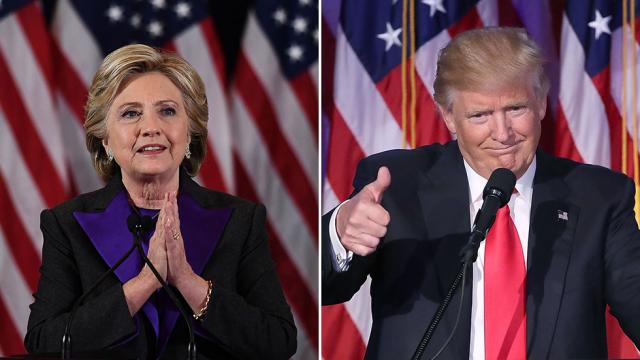
At some point, nonbiased historians (hard to find these days) will take a deeper dive into our recent presidential elections. When they do, an irony should jump out at them: Both Hillary Clinton and Donald Trump are personally responsible for the losses they suffered. Two larger-than-life personalities and egos, who seemingly can’t stand each other, will forever share an asterisk in political history. Who says karma can’t be humorous?
Clinton twice lost the chance to become president. The first time, in 2008, the Democratic nomination was taken from her by a relatively unknown Illinois senator, Barack Obama. The second time, in 2016, as the Democratic nominee, she lost the general election to Trump.
Both losses clearly stung. But to lose the presidency to a man with no political experience and virtually no campaign, someone who was belittled and laughed at from one end of the progressive spectrum to the other, must be the stuff of recurring nightmares.
In 2008, most of the conventional wisdom had then-Sen. Clinton pegged as the inevitable nominee. So, what went wrong? It’s simple: candidate and campaign hubris.
Clinton’s campaign team truly believed it was invincible. Because of that, it underestimated Obama’s toughness, his campaign and the excitement he generated with a constituency that long felt abandoned. Just weeks before he announced his run, the Clinton campaign was assuring the world that Obama would not become a candidate for president. On top of that embarrassingly wrong prediction, strategically and logistically, the campaign team couldn’t get out of their own way.
When Clinton registered a shocking third place in the Iowa caucus, it showed the political world that the Obama campaign not only had figured out how to navigate the complex caucus system — which Clinton’s campaign mostly ignored — but was not going to concede a single delegate.
Quite ironically, and seemingly forgotten by many in the news media, as Obama racked up delegate after delegate, it was then that Clinton first rolled out the argument “But I’ve got more popular votes than him.”
Most pundits believed Clinton had learned her lessons from the tactical errors of 2008 and once again installed her as the prohibitive favorite to win the presidency in 2016. Just weeks before the election, the RealClearPolitics average put Clinton up 7 points over Trump, a theoretically unbeatable number — until it wasn’t.
Inexplicably, Clinton decided she didn’t need to campaign in Wisconsin and barely did so in Michigan. More than that, she apparently thought it was a winning political move to label potential Trump supporters as “deplorables” and, in March 2016, at a Democratic town hall meeting in Ohio, to declare, “We are going to put a lot of coal miners and coal companies out of business.” That was a jaw-dropping gaffe considering that she needed to win coal-rich Pennsylvania in the fall.
She went on to lose all three of those states by close margins. As accurately summarized by the liberal authors of the book “Shattered,” “While Hillary was measuring the drapes in the Oval Office, her team was mis-measuring the electorate.”
Next, we come to Trump and his 2020 campaign. The argument can be made that Trump lost because he was a flat-out jerk at times, one who shamefully turned the office of the president into a WWE SmackDown chamber as he continually barked out insults.
As Trump supporter Conrad Black more delicately put it in a recent column for American Greatness, “Americans demand more dignity of the president and a president who is less exhausting and constantly in the face of the country — not only during all waking hours but, through his Twitter account, during much of every night.”
In the end, Trump could not deliver such dignity.
Consider the state of Arizona, historically a reliably red state, which Trump managed to lose by about 11,000 votes. How? Well, to start with, he repeatedly had bashed the late Sen. John McCain, Arizona’s war hero. That presumably cost Trump more than 10,000 votes among the more than 3 million cast.
Several Republican political professionals with whom I spoke believe that Trump’s bullying tactics directly cost him 10 percent of the vote. Let’s assume they are being much too punitive and dial down that estimate to, say, 1.5 percent of voters who were turned off by Trump’s infantile affronts after initially intending to vote for him.
Even giving him that generosity, Trump lost Arizona and its 11 electoral votes by three-tenths of 1 percent of the vote. He lost Georgia and its 16 electoral votes by two-tenths of 1 percent of the vote. He lost Wisconsin and its 10 electoral votes by seven-tenths of 1 percent of the vote, and he lost Pennsylvania and its 20 electoral votes by 1.2 percent of the vote. If we add up the electoral votes lost to Trump’s churlishness, we get 57. Had Trump won these states along with those he did win in November, his Electoral College votes would have totaled 289 instead of 232 and President Biden’s total would have dropped from 302 to 245, making Trump the winner.
Tens of millions of Americans collectively put their faith in Hillary Clinton and Donald Trump and their respective visions for our nation. Sadly for those voters, the vanity and condescending attitudes of these two candidates betrayed that trust. It is, as former two-term President Obama might say, “a teachable moment” regarding outsize egos and political hubris.
Douglas MacKinnon, a political and communications consultant, was a writer in the White House for Presidents Ronald Reagan and George H.W. Bush, and former special assistant for policy and communications at the Pentagon during the last three years of the Bush administration.
Via The Hill
